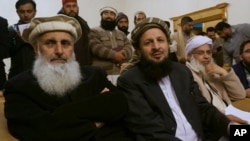ISLAMABAD —
A key minister in Pakistan said Tuesday that local Taliban insurgents involved in peace talks with the government are asking for a political role in any future arrangement to stabilize the violence-plagued tribal territory on the Afghan border. The minister, however, says the Taliban will not be given such a role.
Prime Minister Nawaz Sharif has recently initiated a peace process with the Pakistani Taliban to negotiate an end to years of violence that has claimed thousands of lives.
The Islamist militants are entrenched in Pakistan's volatile Federally Administered Tribal Areas, known as FATA, from where they direct anti-state activities and allegedly sponsor cross-border attacks in Afghanistan.
The Pakistani Minister for States and Frontier Regions, Abdul Qadir Baloch, says that militant activities and counterinsurgency army offensives in the past decade have weakened state control over FATA.
Addressing an international seminar in Islamabad Tuesday, he said the government is trying to find ways to reestablish its authority in the border region and the ongoing peace process is part of those efforts.
The minister ruled out any possibility of giving political concessions to Taliban militants, condemning them as “murderers and killers.”
“Taliban even today are asking for some sort of a role in future arrangement of the FATA area. Whatever I have learned in these eight or nine months that I have been the minister of FATA area, I don’t find any place for them in that society, I just don’t find any place for them. They just cannot be tolerated," said Baloch.
Baloch went on to suggest that even if a settlement is reached with the Taliban, the local tribal population is unlikely to reconcile with the militants.
“Hundreds and hundreds of people have been killed by the Taliban. There is a tribal tradition, tribal people take revenge and the revenge killings are going to then start off. So, even if a solution is found out there cannot be a space left for those elements of the Taliban who have been involved in killing of tribal people, in displacements, in bringing about those miseries to the tribal people," he said.
Prime Minister Sharif’s peace initiative has drawn criticism from within and outside the country because the government has until now refused to discuss its agenda for the talks with the Taliban, or to say how far it is willing to go to negotiate peace.
Critics have said the government should not talk with extremists who have the blood of Pakistanis on their hands and have condemned the country’s political system as un-Islamic.
Sharif and his advisers defend the peace process, saying they want to try all possible peaceful means before considering a military offensive again Taliban strongholds, which are primarily located in the rugged mountainous tribal territory called North Waziristan.
A government delegation was to be flown to an undisclosed so-called “peace zone” for direct talks with Taliban officials on Tuesday but bad weather reportedly prevented them from undertaking the journey.
Prime Minister Nawaz Sharif has recently initiated a peace process with the Pakistani Taliban to negotiate an end to years of violence that has claimed thousands of lives.
The Islamist militants are entrenched in Pakistan's volatile Federally Administered Tribal Areas, known as FATA, from where they direct anti-state activities and allegedly sponsor cross-border attacks in Afghanistan.
The Pakistani Minister for States and Frontier Regions, Abdul Qadir Baloch, says that militant activities and counterinsurgency army offensives in the past decade have weakened state control over FATA.
Addressing an international seminar in Islamabad Tuesday, he said the government is trying to find ways to reestablish its authority in the border region and the ongoing peace process is part of those efforts.
The minister ruled out any possibility of giving political concessions to Taliban militants, condemning them as “murderers and killers.”
“Taliban even today are asking for some sort of a role in future arrangement of the FATA area. Whatever I have learned in these eight or nine months that I have been the minister of FATA area, I don’t find any place for them in that society, I just don’t find any place for them. They just cannot be tolerated," said Baloch.
Baloch went on to suggest that even if a settlement is reached with the Taliban, the local tribal population is unlikely to reconcile with the militants.
“Hundreds and hundreds of people have been killed by the Taliban. There is a tribal tradition, tribal people take revenge and the revenge killings are going to then start off. So, even if a solution is found out there cannot be a space left for those elements of the Taliban who have been involved in killing of tribal people, in displacements, in bringing about those miseries to the tribal people," he said.
Prime Minister Sharif’s peace initiative has drawn criticism from within and outside the country because the government has until now refused to discuss its agenda for the talks with the Taliban, or to say how far it is willing to go to negotiate peace.
Critics have said the government should not talk with extremists who have the blood of Pakistanis on their hands and have condemned the country’s political system as un-Islamic.
Sharif and his advisers defend the peace process, saying they want to try all possible peaceful means before considering a military offensive again Taliban strongholds, which are primarily located in the rugged mountainous tribal territory called North Waziristan.
A government delegation was to be flown to an undisclosed so-called “peace zone” for direct talks with Taliban officials on Tuesday but bad weather reportedly prevented them from undertaking the journey.




